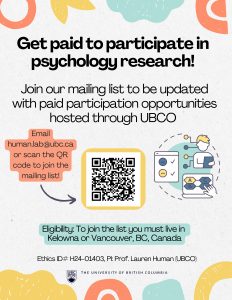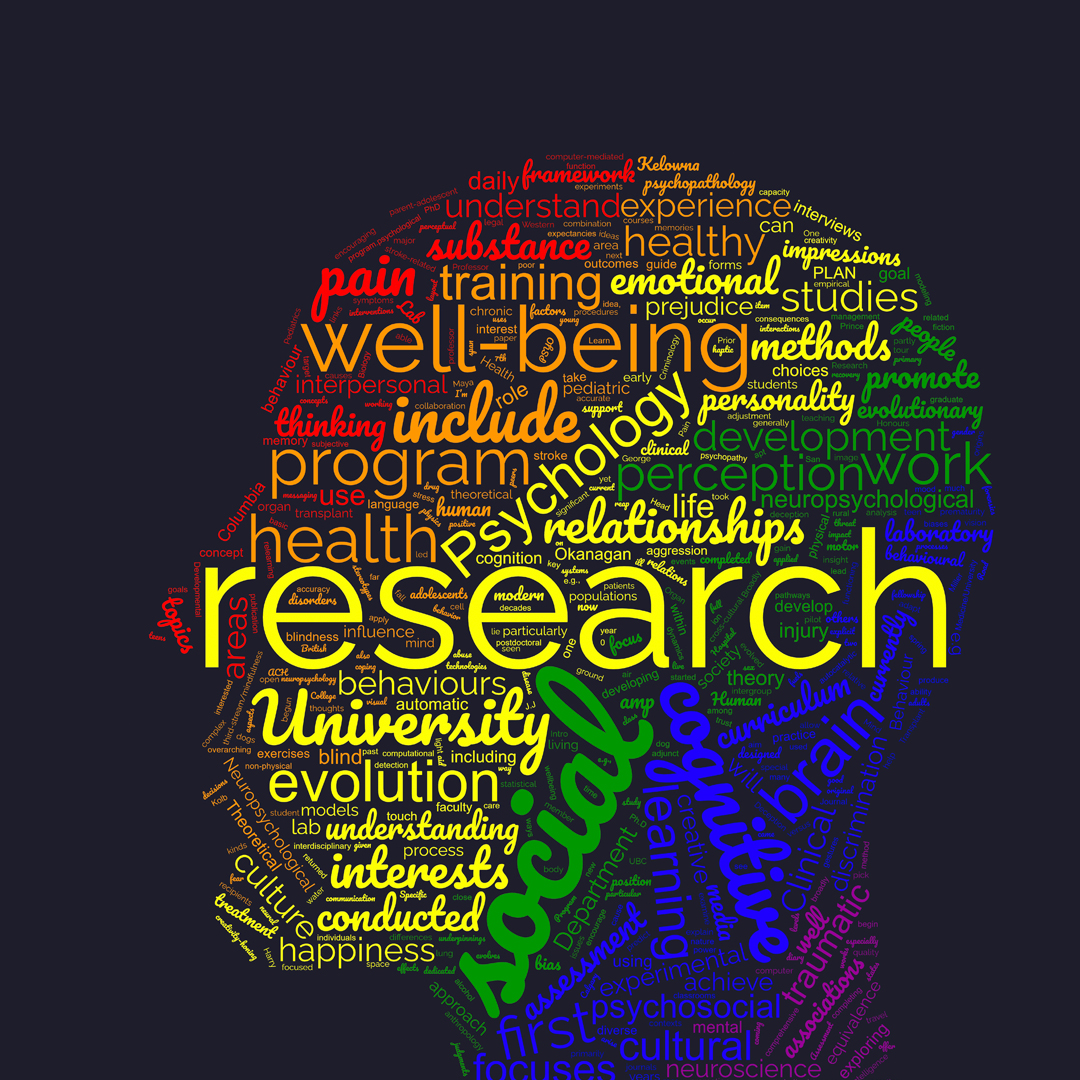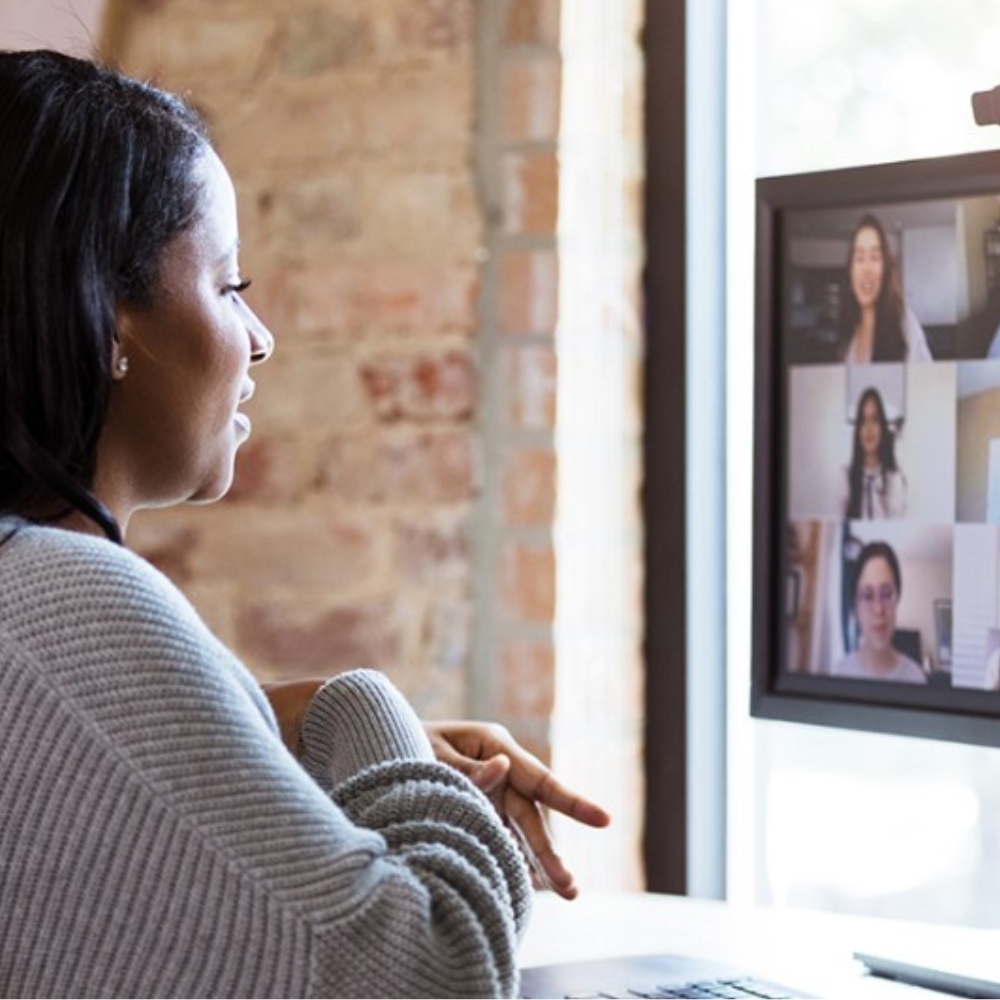CENTRES, INSTITUTES AND LABS
Our labs and centres form the foundation of our research efforts, where our faculty work with a number of community partners to advance knowledge and practice in the field of psychology and provide hands-on research and learning opportunities for students.
The Centre works to identify effective services for children and families at risk of maltreatment. We look at the kinds of services that are available to help children and families, but also what the evidence shows about what kinds of support help the most.
The CORE is a Canadian Foundation for Innovation (CFI) funded research laboratory at the University of British Columbia’s Okanagan campus. The CORE dedicates its research to helping individuals achieve a healthy weight and improve their overall health and well-being through behavioural modifications and novel interventions such as Small Changes and ENHANCE.
Looking at cognition, substance use/abuse, associations and memory, with a particular focus on substance use in adolescents, mindful rest training in relation to substance use, and implicit cognitions.
We are interested in topics related to emotion dynamics and development, including family dynamics in adolescence and the associations between stress and emotions. We are interested in how these dynamics are related to mental health and well-being. We examine how complex emotion processes unfold over time using multiple approaches, including observations of behaviour, measurement of physiological responses, and questionnaires.
Investigating the impact of psychosocial factors, such as stress, mood and social support on physical health and well-being. We are particularly interested in understanding the ways in which social relationships influence emotional and physical health among healthy and chronically ill populations.
The Human Sexuality Lab focuses its sex-positive research efforts on all things sexuality, sex, sexual health/education, feminist topics, gender issues, sexually explicit material, and more. We are particularly interested in understanding aspects of sexual behaviour, through an intersectional lens, that may be impacted by implicit gender roles and scripts. Many of our current research interests centre around alternative sexualities and lifestyles. Due to the sensitive nature of these topics, some prior experience or comfort with these topics is preferred (PSYO 353/354 recommended). This lab encourages undergraduate student-led research wherein students create their own research projects – there will be opportunities to use archival data or mentor-led research ideas. Not accepting graduate students.
The Neuroplasticity, Imagery, and Motor Behaviour Laboratory (NIMBL) is dedicated to research in the areas of motor learning and stroke-related neuroscience, encompassing both basic and applied neuroscience.”
Using platforms such as eye-tracking, electroencephalogram, behavioural testing and neuropsychological assessment to better understand the cognitive aspects of psychopathology, as well as functional outcome following stroke and brain injury.
Located on the UBC Okanagan campus, the clinic provides cost-effective treatment options to students, staff, faculty, and the general public. Treatment is provided by graduate students under supervision of qualified, trained professionals.
The SEED lab investigates how inequities map onto differences in social and emotional development. The work done in the SEED lab is focused on bolstering our understanding of the mechanisms by which individuals manage and navigate their emotions, particularly individuals experiencing adversity. We are also passionate about investigating the ways that adversity, such as poverty, disrupts healthy development more broadly.
The SIP lab primarily investigates causes and consequences of accurate interpersonal impressions. We explore what psychological, social, and biological factors promote how accurately we see and are seen by others, and whether accuracy in turn has implications for our social relationships and psychological well-being.
Focusing on the use of cannabis and psychedelics for therapeutic and recreational purposes, the lab examines the associations between cannabis use, mental health and addictions.
The Truth and Trust Lab at University of British Columbia studies whether humans can accurately discriminate friend from foe, how this process unfolds, and the conditions under which we are persuaded to place our trust in others. We use diverse methods – including nonverbal behavioral coding, implicit cognitive tests, psychophysiological and neuroendocrine reactions – to understand how trust, affiliation, and influence unfold in the real-world.
Research Themes
Psychopathology
Differentiating normal and abnormal personality using state-of-the-art statistical and psychometric methods. Interpersonal behaviour patterns associated with psychopathology.
Cannabis Use
Examining the therapeutic and non-therapeutic use of cannabis, with a specific focus on cannabis, mental health, and substance use.
Cognition and Substance Use
Examining the role of cognitive processes in the development of substance use behaviours. This research studies substance use as multifaceted behaviour influenced by both rational and spontaneous thinking.
Cognitive Psychology
How does your mind work? What are the links between mind and brain operations? These are the topics investigated by cognitive researchers.
Computer-mediated Communication
Online collaborative games designed to promote understanding of self and others as well as meaning in life.
Creativity
Conducting empirical studies on creative style and creative influences, computational models of the cultural evolution of creative ideas and computational creativity experiments in art and music.
Health Psychology
The study of psychological and behavioural processes in health, illness, and healthcare. It is concerned with understanding how psychological, behavioural, and cultural factors contribute to physical health and illness.
Human Sexuality
Examining aspects of sex, gender, and sexual scripts in order to understand what influences how, why, and what behaviours people engage in and what thoughts they may have.
Laterality and Brain Hemisphere Interactions
Is one of the brain’s hemispheres better than the other at performing a task? Are two hemispheres better than one? These are the questions investigated by research into laterality and hemispheric interaction, respectively.
Positive Psychology, Happiness and Well-being
Though much of psychology focuses on dysfunction and deficits, positive psychology focuses on strengths and thriving through researching strategies that contribute to enduring enhancement of happiness.
Rural Mental Health
Understanding the mental health-related experiences of adults 50+ years of age who live in rural communities. Specific studies explore stigma, gaps, and barriers to accessing mental health-related services in these communities, and the development and implementation of community-based services and supports.
Social and Personality
The study of the development of personality and individualistic traits. Personality psychologists look at people as individuals rather than as members of society. Social psychology is the study of how people’s thoughts, feelings, and behaviours are influenced by social situations.
Statistics Research and Methods
Best methods and programming options for factor analysis, item response theory and Bayesian data analysis.
Opportunities for Undergraduate Students
The Department of Psychology offers many opportunities for undergraduate students to gain valuable research experience.
You can engage in research as a participant, including for paid studies. See our department’s paid study list and join the mailing list below.
You can also get involved as a researcher, either as a volunteer research assistant, or through Directed Studies and/or Honours opportunities.
Explore your options and apply below.

The position: Carry out your own research project under the supervision of a psychology faculty member. Opportunities include, but are not limited to, designing research studies, collecting data/running participants, conducting literature reviews, writing annotated bibliographies, analyzing data, preparing research presentations, and/or writing research reports. The project is determined based on the interests of the supervising faculty member, the student, and the requirements of the research lab.
This position is non-paid, but students earn three or six credits for the project, depending upon if they register for a one-term or two-term option.
Prerequisites: Third-year standing, the permission of a psychology faculty member to supervise the project, and a minimum 76% average over all courses taken. Students are also limited to credits per year.
| Experience | Yes |
| Credits | Yes |
| Paid | No |
The position: Investigate a research problem in psychology under the supervision of a psychology faculty member. You will be involved in all aspects of the research process, such as research design, data collection, and data analysis. Presenting findings is another key component of research, and this option requires completion of a written report and a public presentation of your research findings.
Completion of the undergraduate honours thesis contributes six credits towards your degree, but does not guarantee an honours distinction. To receive the honours distinction, you will also need to satisfy all of the graduation requirements including, but not limited to, a minimum average of 76% in all psychology courses, and a minimum average of 76% over the last 60 credits.
Prerequisites: Completion of PSYO 372 with a minimum average of 76%, permission of the Department Head, and a minimum grade average of 76% in all attempted psychology courses.
| Experience | Yes |
| Credits | Yes |
| Paid | No |
The position: An entry-level research experience; students gain first-hand familiarity conducting psychological research; the scope of the work will vary, but will involve active participation with ongoing research. Pass/Fail.
Prerequisites: One of PSYO 111, PSYO 121. 9 credits; permission of the head and a faculty member prepared to supervise the experience.
| Experience | No |
| Credits | Yes |
| Paid | No |
Awards for Undergraduate Students
The Undergraduate Research Awards (URA) provide exceptional research experiences for students at UBC’s Okanagan campus.
The purpose of the awards is to encourage undergraduate students to pursue innovative and original research as part of their learning experience.
Our Partners and Donors
Together, we are making a difference, locally and around the world. Our partners and donors allow us to carry out our mission of helping the community, making advancements in psychological research, and providing quality education in the field of psychology.
If you are interested in becoming a partner or donor, we would love to hear from you.




